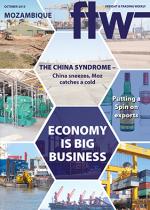Despite being seen by
some as the “big bad
boy” in the logistics
chain, Kudumba
operations director Nigel
Hallowes says he “sleeps well at
night”.
Kudumba has a ten year
contract to provide scanners
to Mozambican customs at all
entry and exit points in the
country.
When the scanners were first
installed FTW was told by a
number of freight forwarders
that they were simply adding to
the costs of doing business in
Mozambique and were slowing
down transit times.
Hallowes responds by saying
that the scanners are necessary
to curb smuggling and to
ensure that the Mozambican
government collects the
revenues due to it.
And, he says, transit times
have dropped from five days
where containers are held by
customs and inspected to “four
minutes”.
Kudumba has invested US$40
million in the infrastructure
required to scan road and rail
trucks, as well as airfreight.
Asked why it was necessary
to scan ore trucks, Hallowes
provides two reasons.
First is that they are used to
smuggle everything from beer
to cigarettes and even people.
Second is that he believes it
is the responsibility of everyone
moving freight in and out of
Mozambique to contribute to
the costs of the scanners.
This enables a f lat US$100
per truck cost to be levied
across the board. The
alternative would be for owners
of more valuable cargo to pay
higher rates.
It costs around US$250 000 a
year to maintain a scanner, and
US$2 million in spares have
to be kept on hand in order to
ensure that Kudumba meets its
service level agreement of 96%
availability.
“We are exceeding that. In
fact, what makes me sleep well
at night is the knowledge that
we have a world class operation
that few other countries in the
world can come near,” he says.
The sophisticated dualview
scanners provide a three
dimensional image of the cargo.
Images are interpreted
by customs officers and not
Kudumba staff, he says.
Ongoing training is provided
by Kudumba to help customs
interpret the images. Organic
and inorganic compounds show
up in different colours, for
example – which helps identify
items such as rhino horn and
elephant tusks.
Hallowes is adamant that
the Mozambican government
was losing millions in revenue
before the installation of the
scanners.
“When we
started it was
found that almost
every container
was mislabelled.
Customs revenue
has increased
almost ten-fold
in the nearly
three years that
the scanners have
been operating.
“The scanner does not
lie,” he says.
Scanners speed up customs inspections
21 Oct 2015 - by Ed Richardson
0 Comments
Mozambique 2015

21 Oct 2015
21 Oct 2015
21 Oct 2015
21 Oct 2015
21 Oct 2015
21 Oct 2015
21 Oct 2015
21 Oct 2015
21 Oct 2015
21 Oct 2015
Border Beat
Featured Jobs
New
